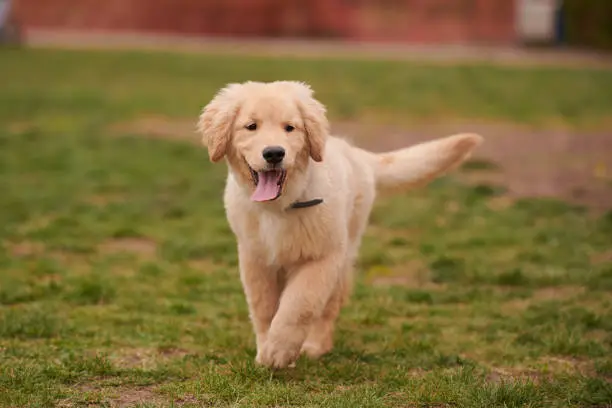Golden Retriever puppies are widely loved for their friendly, loyal, and intelligent nature. With their expressive eyes and soft golden coats, it’s hard not to fall in love at first sight. But beyond their adorable appearance, Golden Retriever puppies are full of energy and need proper care, attention, and training to grow into well-behaved, healthy adults.
Understanding the Golden Retriever
Golden Retrievers were originally bred in Scotland in the 19th century for hunting and retrieving game. Today, they’re known for being versatile dogs, excelling not just as pets but in roles like guide dogs, therapy dogs, and search-and-rescue. Golden Retrievers have a reputation for being gentle and friendly, traits that make them ideal family pets.
Golden Retrievers are large dogs, usually weighing between 55 to 75 pounds when fully grown. They have a dense, water-repellent coat that ranges from light to dark golden. One of the most appealing aspects of the breed is their temperament—Golden Retrievers are typically affectionate, obedient, and eager to please, making them easy to train. They’re also known for being good with children and other pets, further cementing their place as one of the most popular dog breeds.
The Appeal of Golden Retriever Puppies
What sets Golden Retriever puppies apart is their playful and gentle personality. Even as puppies, they display the same loyalty and friendliness that characterize the breed. However, like all puppies, Golden Retrievers require patience and consistent training to ensure they grow up to be well-mannered adults. These puppies are highly intelligent, which can be both a blessing and a challenge. They learn quickly but can also become mischievous if not properly stimulated.
Golden Retriever puppies love to be around people and thrive on social interaction. They’re not suited to being left alone for long periods, as they can develop separation anxiety, which may lead to destructive behavior. Their need for companionship and attention is something all prospective owners should consider.
Finding the Perfect Puppy
When searching for a Golden Retriever puppy, it’s crucial to find a reputable breeder or adoption agency. A responsible breeder will provide health clearances for both the puppy’s parents, showing they’ve been tested for common hereditary conditions like hip dysplasia and heart issues. Be wary of breeders who cannot provide this information or seem focused solely on profit.
Another option is to adopt a Golden Retriever puppy from a rescue organization. Many Golden Retrievers in shelters are there due to changes in their previous owners’ circumstances, not because of behavioral problems. By adopting, you’re giving a puppy a second chance at life, often at a lower cost than purchasing from a breeder.
When choosing a puppy, observe their behavior. Look for a puppy that’s curious and friendly, not overly shy or aggressive. It’s also a good idea to meet the puppy’s parents, if possible, to get a sense of their temperament and size.
Bringing a Puppy Home
Before bringing your new Golden Retriever puppy home, make sure your house is ready for their arrival. Puppy-proofing your home is essential, as curious puppies will explore their environment with their mouths. Remove any hazards like electrical cords, small objects that could be swallowed, and toxic plants. Set up a designated space for your puppy to sleep, eat, and play. A crate can be a great tool for house training and providing your puppy with a safe, comfortable place to rest.
Consider purchasing essential supplies in advance, such as a bed, food and water bowls, puppy food, chew toys, and grooming tools. Additionally, invest in a collar, leash, and ID tag for your puppy’s safety.
Golden Retriever Puppy Behavior
Golden Retriever puppies are bundles of energy and curiosity. During their early months, they will explore their world and begin to develop their social skills. You’ll notice that Golden Retriever puppies tend to be affectionate, eager to please, and very playful. They have a strong desire to bond with their owners, and early training is key to reinforcing good behavior.
During the first few weeks at home, expect your puppy to be inquisitive and slightly mischievous. This is the ideal time to start teaching basic commands and begin crate training. Golden Retrievers are highly intelligent and responsive to positive reinforcement, making training an enjoyable experience for both you and your puppy.
Socializing Your Golden Retriever Puppy
Socialization is one of the most important aspects of raising a well-adjusted Golden Retriever puppy. Expose your puppy to a variety of people, places, sounds, and other animals to ensure they grow up confident and well-behaved. This can help prevent fearfulness or aggression later in life. Puppy classes, walks in the park, and playdates with other vaccinated dogs are great ways to introduce your puppy to the world.
Golden Retrievers are naturally friendly, but proper socialization will enhance their ability to interact positively with people and other pets. Early socialization also helps your puppy develop strong bonds with the family, reducing the risk of behavioral issues like excessive barking or anxiety.
Golden Retriever Puppy Nutrition
Feeding your Golden Retriever puppy the right diet is crucial for their development. Puppies require more calories than adult dogs due to their rapid growth. Choose a high-quality puppy food that is specifically formulated for large breeds. This ensures that your puppy gets the right balance of nutrients for healthy bone development.
Feed your puppy in small, frequent meals to avoid bloating, which can be a problem in large breeds. Golden Retriever puppies should be fed three to four times a day, transitioning to two meals a day by the time they reach six months. Be mindful of portion control to prevent overfeeding, as Golden Retrievers are prone to obesity. Consult your veterinarian for specific dietary recommendations tailored to your puppy’s needs.
Conclusion
Raising a Golden Retriever puppy is a rewarding experience, filled with joy, laughter, and unconditional love. From their playful behavior to their loyal companionship, Golden Retrievers make excellent additions to any family. By understanding their needs and providing the proper care, training, and love, you can ensure your golden retriever puppy grows into a well-rounded, happy adult.
FAQs
How long do Golden Retriever puppies stay puppies?
Golden Retrievers mature slower than smaller breeds and usually remain puppies, in terms of behavior, for up to two years.
How often should I bathe my Golden Retriever puppy?
Golden Retriever puppies should be bathed every 6-8 weeks, or when they get dirty, using a mild puppy shampoo.
Are Golden Retriever puppies easy to train?
Yes, Golden Retriever puppies are highly intelligent and eager to please, making them relatively easy to train with positive reinforcement.
What is the best age to adopt a Golden Retriever puppy?
The ideal age to bring a Golden Retriever puppy home is between 8 and 12 weeks old, as this is when they are weaned and ready to start socialization and training.
How much exercise does a Golden Retriever puppy need?
Golden Retriever puppies need about 5 minutes of exercise per month of age, twice a day. For example, a 3-month-old puppy requires 15 minutes of exercise twice a day.
When do Golden Retriever puppies stop teething?
Golden Retriever puppies usually stop teething around 6 months of age, although the process may vary slightly from one puppy to another.











